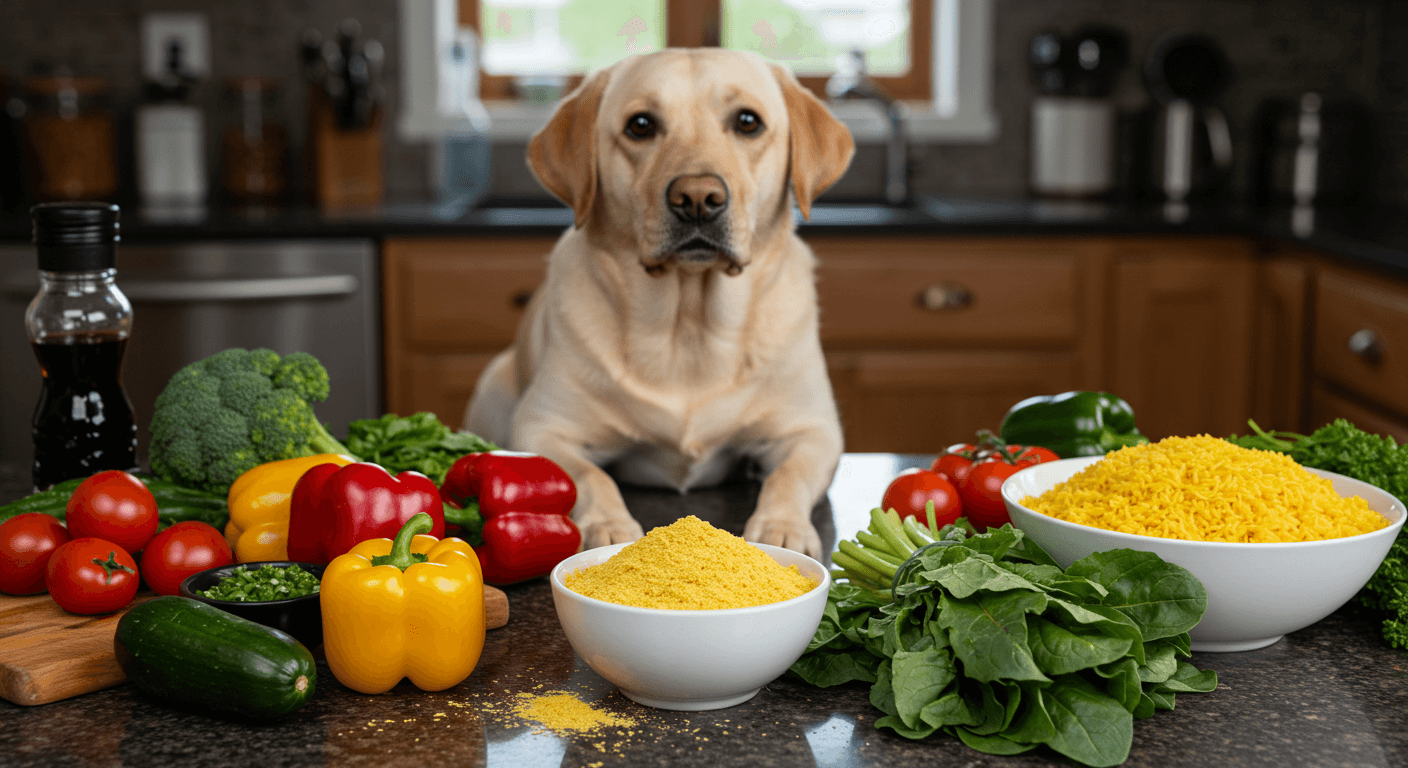As a dog owner, you want the best for your furry friend. You might wonder is nutritional yeast healthy for dogs. It’s packed with B vitamins and minerals like selenium and zinc.
But, is it safe for dogs? What are the benefits and risks? Let’s explore together.
Knowing the pros and cons of nutritional yeast is key. It helps you decide if it’s right for your dog. We’ll look into its effects on dogs’ health. This way, you can make the best choice for your pet.
Table of Contents
What is Nutritional Yeast and Why Consider it for Dogs
Nutritional yeast is a type of yeast that’s packed with protein, fiber, and vitamins and minerals. It’s a great supplement for dogs. It’s often fortified with B complex vitamins like thiamine, vitamin B12, and riboflavin. These vitamins are key for a dog’s health.
When thinking about nutritional yeast for canine health, it’s important to know what it’s made of. It’s different from active yeast. Nutritional yeast is a complete protein, with all nine amino acids. It’s also full of minerals like calcium, iron, and zinc.
Definition and Composition
Nutritional yeast is gluten-free, dairy-free, and vegan. It’s perfect for dogs with certain dietary needs. It has about 50 calories in a 2-tablespoon serving. It also has 8-10 grams of protein, depending on the brand.
Difference from Active Yeast
Nutritional yeast is safe for dogs, unlike active baker’s yeast. It’s also different from brewer’s yeast. Brewer’s yeast is safe for dogs but doesn’t offer the same nutritional benefits as nutritional yeast.
Nutritional Profile Overview
Nutritional yeast is full of important vitamins and minerals. It has thiamine, riboflavin, and vitamin B12. It’s also a good source of selenium, which is an antioxidant. Plus, it has immune-boosting compounds like beta-glucan and alpha-mannan.
The Science Behind Nutritional Yeast’s Benefits for Canine Health
Adding nutritional yeast to your dog’s diet can be a great choice. It’s important to know why it’s good for them. Studies show that it can make digestion better and boost the immune system. This leads to a healthier and happier pet.
Research on yeast, like Saccharomyces cerevisiae, shows it’s good for animals. For dogs, this means it supports their overall health. The demand for yeast products has grown, thanks to its nutritional value.
Some key benefits of nutritional yeast for dogs include:
- Improved digestion and reduced inflammation
- Enhanced immune function
- Increased bioavailability of essential nutrients
When picking a nutritional yeast supplement for your dog, choose a high-quality one. It should be rich in nutrients and made well. Adding nutritional yeast to your dog’s diet can support their health and happiness, leading to a longer life.
Key Benefits of Nutritional Yeast for Dogs
Nutritional yeast is a superfood for dogs, packed with nutrients. It’s rich in protein and amino acids. This makes it a complete protein, giving dogs all the essential amino acids they need.
Feeding nutritional yeast to dogs offers many benefits. These include:
- High-quality protein and amino acids for muscle growth and maintenance
- B-vitamin complex benefits for energy production and nerve function
- Mineral content advantages for healthy bones and immune function
- Digestive health support for a balanced gut microbiome
To add nutritional yeast to your dog’s diet, start with a small amount. Less than a teaspoon is a good starting point. Always check with a vet to find the right amount for your dog’s age, breed, and diet.
Nutritional yeast is a great addition to a dog’s diet. It supports their health and well-being. By knowing how to feed it, you can help your dog stay healthy.
| Nutrient | Amount per 2-tablespoon serving |
|---|---|
| Protein | 8-10 grams |
| Vitamin B1 (Thiamine) | 640% of the daily value |
| Vitamin B12 | 130% of the daily value |
Potential Risks and Side Effects
When thinking about nutritional yeast supplements for dogs, knowing the risks is key. While it’s usually safe, too much can upset a dog’s stomach. It’s important to watch how much nutritional yeast dosage for dogs they get to avoid problems like allergic reactions, weight gain, and bloat.
Start with a small amount of nutritional yeast to see how your dog reacts. Gradually increase it if needed. Always pick a high-quality supplement made for dogs to keep them safe.

- Upset stomach
- Allergic reactions
- Weight gain
- Interference with medications
- Bloat
Knowing these risks helps you use nutritional yeast supplements for dogs safely. This way, you can keep your dog healthy and happy.
Is Nutritional Yeast Good for Dogs with Special Dietary Needs
As a dog owner, you might wonder if nutritional yeast is good for dogs with special needs. The answer is yes, but it depends on the dog. Nutritional yeast can help dogs with special needs, like senior dogs, puppies, and dogs with health issues.
Senior dogs can get important nutrients from nutritional yeast, like protein and vitamins. Puppies also benefit from it, as it supports their growth. Dogs with health problems, like digestive issues or food allergies, might find it helpful too.
Before adding nutritional yeast to your dog’s diet, talk to a vet. They can tell you if it’s good for your dog and how much to give. With the vet’s advice, nutritional yeast can be a great addition to your dog’s diet, helping their health.
Some benefits of nutritional yeast for dogs with special needs include:
- Supports growth and development in puppies
- Provides essential nutrients for senior dogs
- May help alleviate digestive issues and food allergies
Adding nutritional yeast to your dog’s diet can help meet their special needs. It supports their health and well-being. Always check with a vet before changing your dog’s diet.
| Dog Type | Benefits of Nutritional Yeast |
|---|---|
| Senior Dogs | Provides essential nutrients, supports overall health |
| Puppies | Supports growth and development |
| Dogs with Health Conditions | May help alleviate digestive issues and food allergies |
How to Choose the Right Nutritional Yeast for Your Dog
When picking nutritional yeast supplements for dogs, it’s key to think about a few things. This ensures your pet gets a top-notch product. With so many types of nutritional yeast out there, finding the right one can be tough. But, the right choice can really help your dog.
Look for products with B complex vitamins like thiamine, vitamin B12, and riboflavin. These vitamins are good for your dog’s brain, thinking skills, and immune system. Also, check how the product is made and if it’s safe and works well.
Here are some important things to think about when picking a nutritional yeast supplement for your dog:
- What’s in it and how it’s made
- Quality checks and safety measures
- Third-party tests and certifications
- The company’s reputation and knowledge
By looking at these points and picking a high-quality nutritional yeast supplement for dogs, you can help your pet stay healthy. Always talk to a vet before adding new supplements to your dog’s diet.
| Product Feature | Importance |
|---|---|
| Fortified with B complex vitamins | Helps with brain health and immune system |
| Manufactured with quality control measures | Makes sure it’s safe and works well |
| Third-party tested and certified | Guarantees the product’s quality |
Proper Dosage Guidelines
When giving your dog nutritional yeast, it’s key to follow the right dosage. This ensures your pet gets the benefits without harm. The amount depends on your dog’s weight, age, and health. Start with ½ teaspoon for every 10 pounds of body weight.
For puppies or dogs with sensitive stomachs, start with ¼ teaspoon per 10 pounds. Gradually increase as they get used to it. This helps you feed them safely and effectively. Always watch how your dog reacts and adjust the dose if needed.
Signs of proper dosing include better digestion, more energy, and a healthier coat. If you see any bad reactions, like upset stomach or allergies, adjust the dose or talk to your vet. By following these tips and knowing your dog’s needs, you can help their health and well-being.
Weight-Based Recommendations
- Small breeds (under 20 pounds): ¼ to ½ teaspoon per day
- Medium breeds (21-50 pounds): ½ to 1 teaspoon per day
- Large breeds (51-80 pounds): 1 to 1 ½ teaspoons per day
- Extra-large breeds (over 80 pounds): 1 ½ to 2 teaspoons per day
Success in supplementation comes from gradual introduction and the right amount. Consider your dog’s unique needs and health. Always talk to your vet if you have questions about feeding nutritional yeast to dogs or the right dosage.
Creative Ways to Add Nutritional Yeast to Your Dog’s Diet
There are many ways to add nutritional yeast to dogs in their meals. You can sprinkle it over their kibble or mix it into their wet food. This is a simple way to boost their nutrition.
Another fun idea is to use it in homemade treat recipes. You can mix it with peanut butter, banana, and honey. This creates tasty, healthy treats for your dog.
Here are some more ways to add nutritional yeast to your dog’s diet:
- Mix it with their regular food
- Use it in homemade treat recipes
- Add it to their training treats
Nutritional yeast is a fantastic addition to any dog’s diet. It’s packed with protein, amino acids, and B vitamins. These nutrients support your dog’s health and well-being.

Ways to Add Nutritional Yeast to Your Dog’s Diet
| Method | Description |
|---|---|
| Mixing with regular food | A simple and easy way to add nutritional yeast to your dog’s diet |
| Homemade treat recipes | A fun and creative way to provide your dog with healthy, nutritious treats |
| Training treats | A great way to reward your dog during training sessions while providing a nutritious snack |
When to Avoid Giving Your Dog Nutritional Yeast
Nutritional yeast can be good for dogs, but there are times to avoid it. If your dog has a yeast allergy or sensitivity, don’t give them nutritional yeast. While rare, yeast allergies from nutritional yeast can happen in dogs.
Vets say nutritional yeast and dogs can work well together. But, always talk to a vet before adding it to your dog’s diet. This is especially true if your dog has health issues. Nutritional yeast for canine health is good, but not for every dog.
Here are some times to skip giving your dog nutritional yeast:
- Dogs with yeast allergies or sensitivities
- Dogs with certain health conditions, such as digestive issues or immune system disorders
- Dogs that are pregnant or nursing
In these cases, look for other supplements or talk to a vet. This way, you can make sure your dog gets the benefits of nutritional yeast safely.
| Scenario | Recommendation |
|---|---|
| Dogs with yeast allergies | Avoid nutritional yeast |
| Dogs with health conditions | Consult with a veterinarian |
| Healthy dogs | Follow recommended dosage guidelines |
Expert Veterinary Opinions on Nutritional Yeast Supplementation
Veterinary experts have different views on nutritional yeast supplements for dogs. Some suggest they can be good for nutritional yeast for dog nutrition. They offer important nutrients like protein, vitamins, and minerals.
Studies show that yeast-based products, including nutritional yeast supplements for dogs, can be beneficial. They help boost the immune system, improve digestion, and even lower stress and anxiety.
Here are some key benefits of nutritional yeast for dog nutrition:
- Supports immune system function
- Improves digestion and reduces symptoms of digestive issues
- Provides essential nutrients like protein, vitamins, and minerals
- May help reduce stress and anxiety in dogs

In conclusion, many vets agree that nutritional yeast supplements for dogs are good. They support a dog’s health and well-being through nutritional yeast for dog nutrition.
| Benefits | Description |
|---|---|
| Immune System Support | Helps support the dog’s immune system, reducing the risk of illness and infection |
| Digestive Health | Improves digestion, reducing symptoms of digestive issues like diarrhea and vomiting |
| Nutrient Provision | Provides essential nutrients like protein, vitamins, and minerals, supporting overall health and well-being |
Conclusion
Nutritional yeast can be good for dogs if used right. It offers high-quality protein, a rich B-vitamin complex, and important minerals. But, always talk to your vet before adding it to your dog’s food. The right amount depends on your dog’s size, age, and health.
Even though nutritional yeast is usually safe for dogs, watch for any side effects like stomach problems. Working with your vet and slowly adding it to your dog’s diet can help. This way, your dog can enjoy its benefits without risks. With careful planning, nutritional yeast could be a great part of your dog’s healthy diet.

